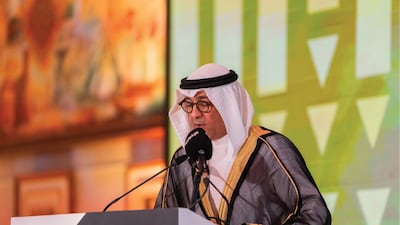The Gulf Co-operation Council has presented its unified vision for regional security for the first time in its 43-year history.
The published document, which outlined steps to be taken to overcome differences, emphasised that disagreements should be settled through diplomacy, not force.
“Disputes between countries should be resolved through negotiations, diplomacy, and dialogue, rejecting the use or threat of force, in order to protect the security and stability of the region,” GCC Secretary General Jasem Al Budaiwi said at a ceremony late on Thursday at the General Secretariat in Riyadh.
“The GCC's vision for regional security is not just a political commitment, but an ethical dedication that unites us all. Our common security is the foundation upon which we build our hopes and dreams for a better future.”
Saudi Arabia, the UAE, Bahrain and Egypt ended a three-and-a-half-year dispute with Qatar in January 2021 with the GCC Al Ula agreement. The four countries cut diplomatic, trade and transport ties with Qatar in 2017 over its support of extremist groups.
The GCC vision sets out 15 pillars, including those focused on regional security and stability, economy and development, and environment and climate change.
It also confirms support for international and regional efforts to make the Gulf region free of weapons of mass destruction, while emphasising that addressing nuclear risks is “essential to maintaining the security of the region and preventing it from falling into a nuclear race”.
The six-member GCC in the past year has pushed for diplomacy with partners, including the EU.
There has been a diplomatic push to implement a strategic partnership that was started between the EU and the GCC in 2022.
EU foreign affairs ministers and their Gulf counterparts will meet in Luxembourg next month to discuss regional security issues, European officials have told The National.
The continuing war in Gaza is likely to be high on the agenda as the bloc struggles to mend diplomatic ties with the Arab region that have been undermined by accusations of double standards on the conflict.
Energy stability
The document also stresses the importance of ensuring the stability of global energy markets.
“The vision emphasises the importance of working intensively to ensure the stability of global energy markets, in a way that achieves the interests of producer and consumer countries, spares the world the negative effects resulting from market fluctuations and disruption of global supply chains, and calls for avoiding the politicisation of these issues due to the negative repercussions that they may have on the global economy,” the GCC document said.
The newly unified vision was a substantive revision of earlier formulations following internal and external developments, GCC Assistant Secretary General for Political Affairs and Negotiation Abdel Aziz Aluwaisheg wrote in Saudi Arabia-based newspaper Arab News.
“The objective of the newly formulated vision is clearly to preserve the security and stability of the GCC states and the prosperity of its people but also to contribute significantly to regional and international peace and security,” Mr Aluwaisheg wrote.
“This means tackling regional challenges, transforming them into opportunities for development and prosperity, building the future through settling disagreements by peaceful means, and finding consensus-based solutions that ensure respect for the legitimate interests of all parties while avoiding polarisation.”


